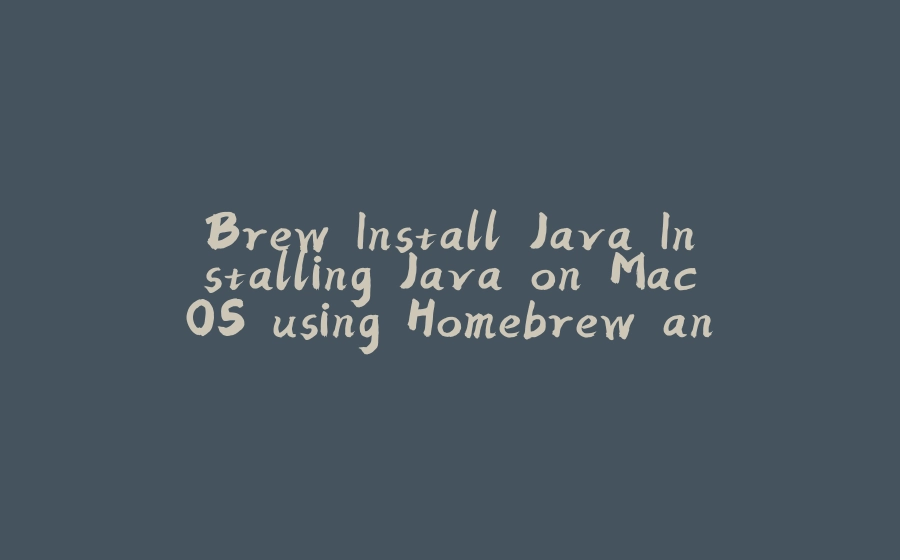I think its fair to say that going through the process of installing Java on any machine is in of itself a bit confusing. For those that come from NodeJS, installing a new version of Node is as easy as installing nvm and running nvm install [some nodejs version] and calling it a day.
The goal of this post is to show that we could do just that with Java, install a package to allow us to toggle between Java versions and set our JAVA_HOME path automatically for us just by running a few simple commands.
Before we start, ensure that you have homebrew installed and that you have updated all dependencies (ie. run brew upgrade)
-
First, we need to install
JEnvusing homebrew, run the following command:$ brew install jenv -
Next, ensure that jenv is listed as a command on your shell, if you are using
bash, then run$ echo 'export PATH="$HOME/.jenv/bin:$PATH"' >> ~/.bash_profile $ echo 'eval "$(jenv init -)"' >> ~/.bash_profileIf using
.zshrc, then run the following$ echo 'export PATH="$HOME/.jenv/bin:$PATH"' >> ~/.zshrc $ echo 'eval "$(jenv init -)"' >> ~/.zshrcNote: It’s important that now you restart your
bashterminal or run. ~/.zshrcto reload your.zshrcnow that we have added a new command shortcut. -
Now let’s go ahead and download a
brew caskfor the jdk version that we are after. Before we go and download the version that we need, ensure that you run the following command to add the brew repo to your machine (https://github.com/AdoptOpenJDK/homebrew-openjdk). Note that to installoracle-jdk, check out the instructions listed here https://formulae.brew.sh/cask/oracle-jdk. Note that the following steps will be only to install the AdoptOpenJDK and not the Oracle JDK. If you need some info on the differences between each type, check out https://www.openlogic.com/blog/java-experts-openjdk-vs-oracle-jdk#:~:text=The biggest difference in OpenJDK,JDK requires a commercial license.&text=Since January 2019%2C businesses now,order to receive software updates.$ brew tap AdoptOpenJDK/openjdk -
Now that we have the
AdoptOpenJDK, let’s run the following command to install Java 8 (jdk1.8.x)$ brew cask install adoptopenjdk8 -
Once the installation completes, we’ll then follow up with
jenvto add this version into our list of available version to be able to toggle between versions. Let’s ensure that we know the location where the jdk package was installed, for MacOS Catalina, that should be under the following directory/Library/Java/JavaVirtualMachines -
If we cd into
/Library/Java/JavaVirtualMachineswe should see the following:adoptopenjdk-8.jdk -
If the above is correct, we’ll go ahead and run the following command to add the location of this version to
jenv$ jenv add /Library/Java/JavaVirtualMachines/adoptopenjdk-8.jdk/Contents/Home -
To confirm that the version is now available on
jenv, run the following commandjenv versions, you should see the following output:openjdk64-1.8.0.252 -
Now to add Java 8 as your overall
globaljava version, run the following command:jenv global openjdk64-1.8.0.252 -
Now, run
java -versionand you should see the following output:openjdk version "1.8.0_252" OpenJDK Runtime Environment (AdoptOpenJDK)(build 1.8.0_252-b09) OpenJDK 64-Bit Server VM (AdoptOpenJDK)(build 25.252-b09, mixed mode)Note: If you still see your old version or nothing at all, ensure that you restart your bash terminal (or .zsrh) to pull in the new path to your Java home (this is set by jenv itself, you don’t need to do anything).
That’s it! Hopefully it was painless and straightforward, next time you need to toggle between versions, just run jenv {version} and you’re all set.
You could also set versions of Java specific to your shell terminal, or directory, simply replace global with local (if you are within a specific directory) or shell for adding a version to specific to the shell you’re running.
Resources:
- https://www.jenv.be/
- https://github.com/jenv/jenv
- https://installvirtual.com/install-openjdk-8-on-mac-using-brew-adoptopenjdk/
- https://www.openlogic.com/blog/java-experts-openjdk-vs-oracle-jdk#:~:text=The biggest difference in OpenJDK,JDK requires a commercial license.&text=Since January 2019%2C businesses now,order to receive software updates
原文链接:Brew Install Java Installing Java on MacOS using Homebrew and JEnv























暂无评论内容